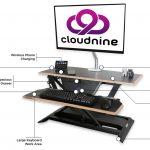It seems simple enough. You have made the decision to open an online store. You have a product(s) to promote and sell. You think that there is a need for it.
Now, all you have to do is set up a website for the online store, figure out how to promote your product(s), and watch the business roll in.
Not so much. While you believe that it might be a waste of time and energy, crafting a business plan for your store is a critical task. Through such a plan, you can set your goals and benchmarks, develop buyer personas, analyze your competition, develop marketing strategies, set a budget, and more. If you don’t get all of this on paper, you won’t have the direction to take the actions you must to be successful.
Formal Vs. Informal
A formal business plan is a lengthy document prepared by businesses that are looking for loans or investors. It has an executive summary and several sections. The document is impeccably written and very formal.
No, you don’t need this. But you need an informal business plan that will act as a roadmap and that will let you know how you are doing as your startup moves along.
Elements of Your Business Plan
Clarify Your Idea by Writing Out a Value Proposition
Exactly what is the value of your product or service to a potential customer? If you can put this in writing, then you will have a start on your company description. What problem does your product or service solve for your target audience? What is unique about it (e.g., how does it improve a customer’s life n some way?
Is production environmentally friendly? Does your business model include social responsibility of some sort)? These are questions to ask yourself as you describe who you are and what you are doing.
Who are You Selling To?
You do need to conduct some research here. Who will be interested in your product or service? You need to develop a buyer persona and then ensure that there is a large enough target audience to make the business profitable?
A buyer persona consists of age, gender, education and income levels, lifestyles, values, pain points, purchasing behaviors, preferred social media platforms, etc.
Knowing your target audience intimately will determine lots of your marketing strategies and tactics.
Who is Your Competition?
A simple Google search using keywords related to your niche will bring up your competition. Check out their websites, blogs, and social media networks. How large is their audience? Does your product or service offer something better or more unique? You have to think about how you can woo customers away from that competition.
Bill Soyers, Co-founder of Top Writers Review, puts it this way: “We review a lot of paper writing websites. This is a highly competitive industry. But what we find is that those agencies that are the most successful have unique products and services that set them apart from their competition – higher quality of writers, more benefits and guarantees, etc. When they can offer these things, they will attract more customers.”
How Will You Market Your Business?
This will tie directly into your customer persona. Once you really understand that customer, you will understand how to best attract and engage him.
Suppose you are planning to offer career clothing to a Millennial audience. What do you know about the professional millennial?
-
- Where do they typically work? In traditional, conservative organizations or in more progressive entities? This will determine the type of clothing you will be marketing. For the most part, it will be what is known as “career casual.”
- What do they value in a company they do business with? They want a relationship; they want that business to be socially responsible. If you tell your story; if you feature social proof from other millennials; if you show that you only offer clothing that has been produced in environmentally responsible ways, you will have a greater chance of earning their trust and business.
- Where do Millennials hang out online? Facebook is obvious, but so are Instagram and Twitter. And many will have presences on LinkedIn. You will need to pick just a couple in the beginning, because your time will be limited and you will need to post often.
What are Your Budget Parameters?
Be realistic about how much it will cost you to open your online store. Obviously, you will need an attractive and compelling website for your online store; you should have a blog; you should be advertising in the right places online; and, if you are going into this fulltime, you must have some means of supporting yourself until your store supports you.
Developing even a rough budget will help. What will you have to outsource and what will that cost? How “bare-bones” can you make your personal budget?
Your budget will have to be flexible, of course, but you need to have an initial idea of expenses when your break-even point will be, and you should have a timeline for meeting those budget goals.
Your plan should include a method by which you will keep a cash-flow statement so that you can track your income growth.
Stick with the Basics at First
These five elements will allow you to conduct the careful planning you need to do as you prepare for the launch of your online store. S mentioned, your business plan does not need to be a formal document. What you need right now is a roadmap to guide you and let you know if you are on track to building success.
















